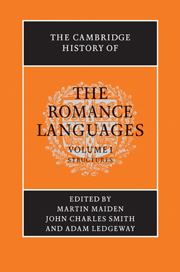Book contents
- Frontmatter
- Introduction
- 1 ROMANCE LINGUISTICS AND HISTORICAL LINGUISTICS: REFLECTIONS ON SYNCHRONY AND DIACHRONY
- 2 SYLLABLE, SEGMENT AND PROSODY
- 3 PHONOLOGICAL PROCESSES
- 4 MORPHOLOGICAL PERSISTENCE
- 5 MORPHOPHONOLOGICAL INNOVATION
- 6 CHANGE AND CONTINUITY IN FORM–FUNCTION RELATIONSHIPS
- 7 MORPHOSYNTACTIC PERSISTENCE
- 8 SYNTACTIC AND MORPHOSYNTACTIC TYPOLOGY AND CHANGE
- 9 PRAGMATIC AND DISCOURSE CHANGES
- 10 WORD FORMATION
- 11 LEXICAL STABILITY
- 12 LEXICAL CHANGE
- 13 LATIN AND THE STRUCTURE OF WRITTEN ROMANCE
- 14 SLANG AND JARGONS
- Notes
- References and bibliographical abbreviations
- Index
11 - LEXICAL STABILITY
Published online by Cambridge University Press: 28 May 2011
- Frontmatter
- Introduction
- 1 ROMANCE LINGUISTICS AND HISTORICAL LINGUISTICS: REFLECTIONS ON SYNCHRONY AND DIACHRONY
- 2 SYLLABLE, SEGMENT AND PROSODY
- 3 PHONOLOGICAL PROCESSES
- 4 MORPHOLOGICAL PERSISTENCE
- 5 MORPHOPHONOLOGICAL INNOVATION
- 6 CHANGE AND CONTINUITY IN FORM–FUNCTION RELATIONSHIPS
- 7 MORPHOSYNTACTIC PERSISTENCE
- 8 SYNTACTIC AND MORPHOSYNTACTIC TYPOLOGY AND CHANGE
- 9 PRAGMATIC AND DISCOURSE CHANGES
- 10 WORD FORMATION
- 11 LEXICAL STABILITY
- 12 LEXICAL CHANGE
- 13 LATIN AND THE STRUCTURE OF WRITTEN ROMANCE
- 14 SLANG AND JARGONS
- Notes
- References and bibliographical abbreviations
- Index
Summary
Introduction
At their core, the ‘Romance languages’ are the direct continuation of Latin or, to be more precise, they are those forms of speech that post-antique spoken Latin (‘vulgar Latin’) turned into in those areas of the former Roman Empire that had been Latinized permanently. Thus, the relationship between Latin and Romance is largely characterized by stability, in the lexicon as well. This means that there is direct (‘lexically immediate’) continuation of Latin vocabulary in all or some of the Romance languages.
This partial, but fundamental, lexical stability and agreement is so evident that even in the pre-scientific era, at the beginning of the fourteenth century, Dante in his De Vulgari Eloquentia (I, viii) was able to infer the common origin of the Romance languages he knew from the fact that they ‘give the same names to many (almost all) things’:
Signum autem quod ab uno eodemque ydiomate istarum trium gentium progrediantur vulgaria, in promptu est, quia multa per eadem vocabula nominare videntur, ut ‘Deum’, ‘celum’, ‘amorem’, ‘mare’, ‘terram’, ‘est’, ‘vivit’, ‘moritur’, ‘amat’, alia fere omnia.
‘But the sign that the popular languages of these three peoples originate in one and the same tongue is obvious: they seem to give the same names to many things, for example “God”, “heaven”, “love”, “sea”, “earth”, “he is”, “he lives”, “he dies”, “he loves”, and to almost all other things.’
The content of Dante's examples embraces ‘on the one hand the whole world and on the other the whole life of the individual in this world’ (Gauger et al. 1981:8). From a modern, scientific and pan-Romance perspective, some of them exhibit unlimited lexical stability in the sense of a pan-Romance, semantically (largely) unchanged continuity.
- Type
- Chapter
- Information
- The Cambridge History of the Romance Languages , pp. 564 - 584Publisher: Cambridge University PressPrint publication year: 2010



